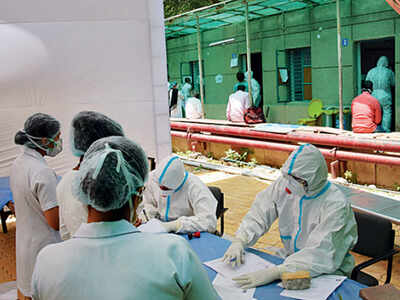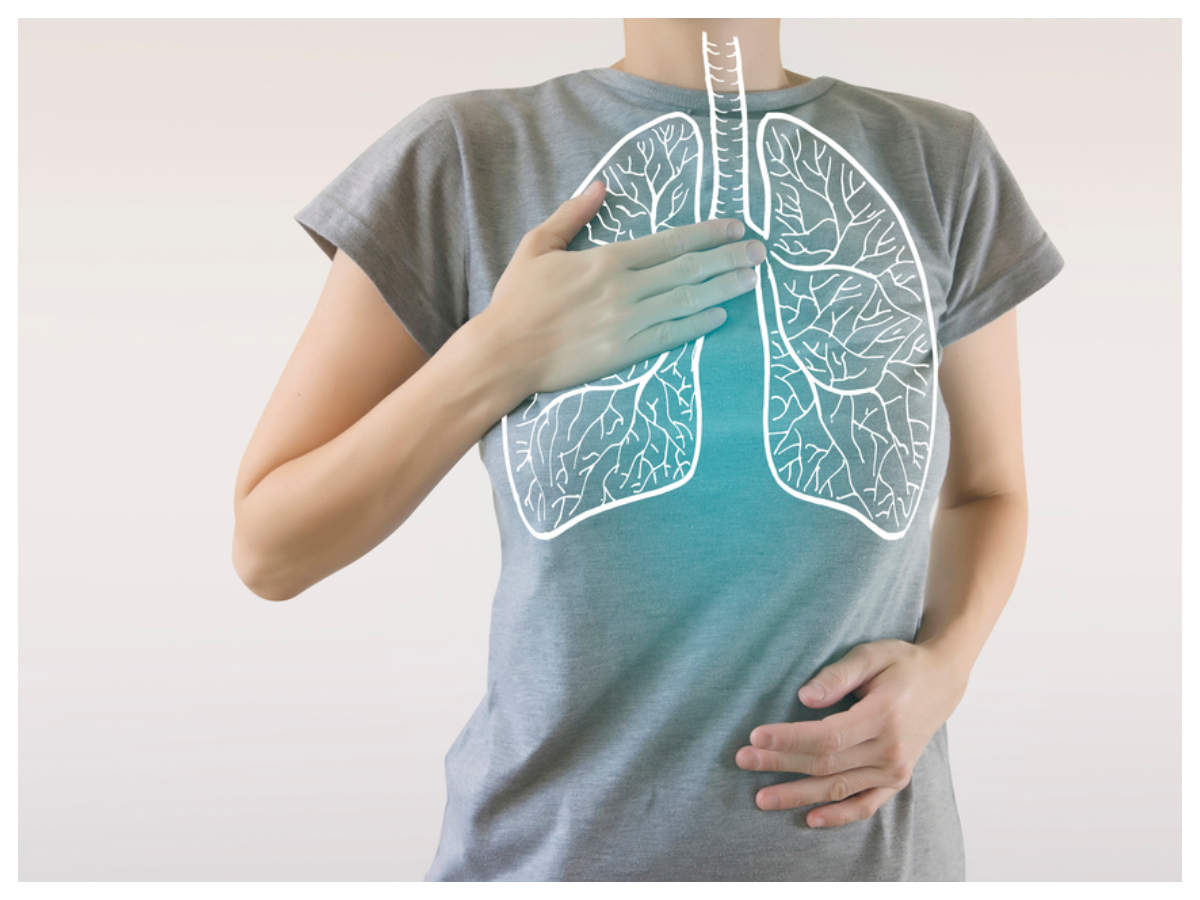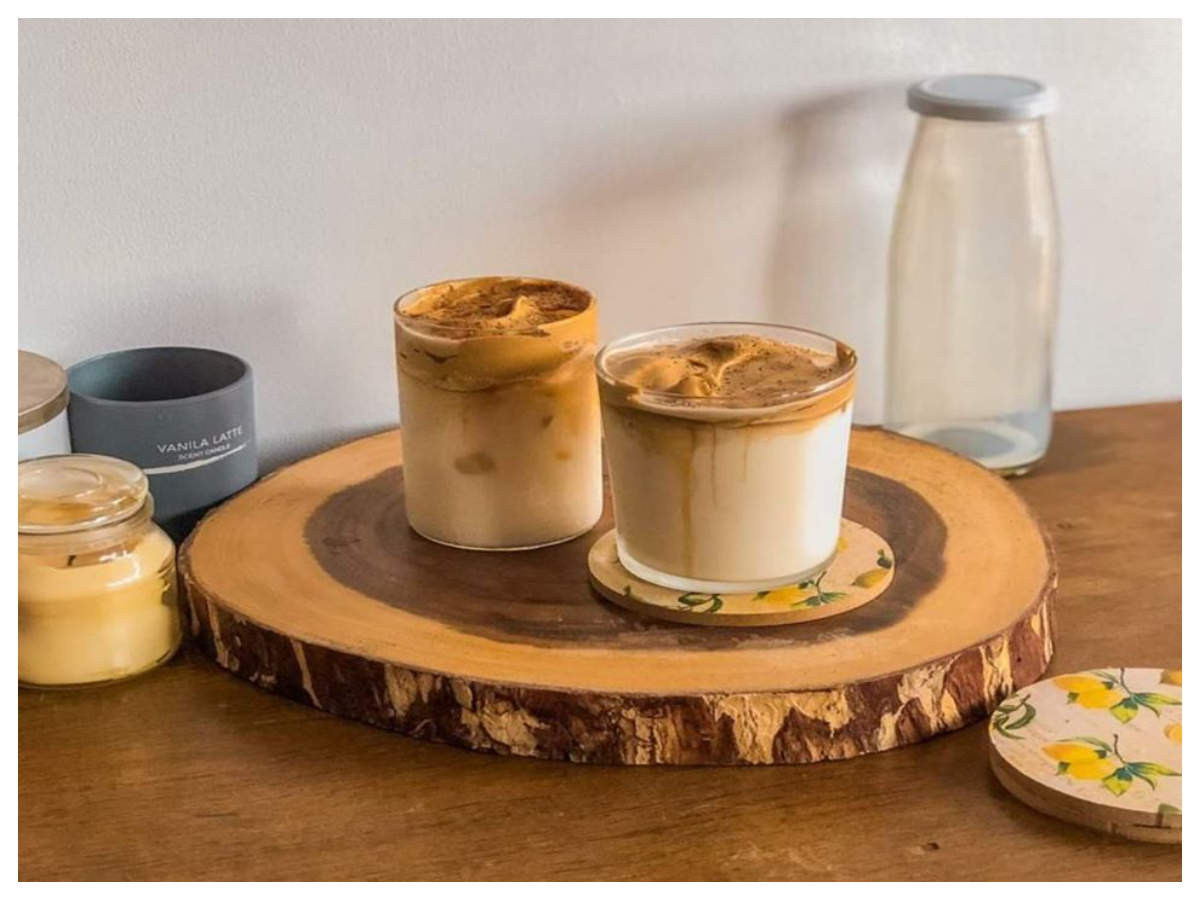
NEW DELHI: “My biggest fear, more than dying, is that my body will be disowned after I die,” said Dr Sumit Kumar (name changed) who is deployed in the Covid-19 ward of one of the biggest government hospitals in the city. “In this war, we are the warriors and before we fight the disease, we win over our fears first,” he added.
Kumar’s hospital, like many others in the capital, is divided into different zones. Entering the “Red Zone” is nothing short of entering a war zone. “This is where Covid-19 positive patients are treated. The zone has a different aura that is hard to describe. There is, of course, apprehension in your mind as you get into Personal Protective Equipment (PPE) in the docking area,” he said.
While the PPE is the primary armour, wearing it for the entire shift has its own challenges. Doctors said that wearing multiple layers of protective gear makes breathing difficult and, with the temperature rising, it becomes extremely uncomfortable and leaves them sweating. This is because air-conditioning is not being used in these wards to avoid spread of novel coronavirus. For the entire shift ranging between 8 and 12 hours, doctors can’t eat, drink or use the washroom.
“There is a crunch of resident doctors and our shifts are of 14 hours at night and 10 hours in the day. PPEs are short and we have been asked to use them judiciously,” said a resident doctor of another hospital. “Also, doctors are not only facing bad behaviour from the public, but are also barred from talking about their problems,” he added.
Dr Chhavi Gupta, spokesperson of Rajiv Gandhi Super Speciality Hospital, said that while it’s not easy working in a PPE, it provides much-needed safety to doctors. “While wearing PPE, we have to assume that we are infected from outside and act accordingly. An average PPE costs about Rs 1,000 and we can’t put the burden on the exchequer by changing it frequently. Wearing it feels like putting on bulletproof armour,” she said.
Gupta added, “We are staying in hotels despite having our homes and families here. Delhi government has provided accommodation to doctors in four and five-star hotels and nurses and other staff has been put up in two and three-star hotels. While treating Covid-19 patients, we forget everything and just focus on our duty. It’s a pandemic. When there is a war going on, we shouldn’t be going home.”
Dr Piyush Singh of Hindu Rao Hospital said, “The society has to understand that if we stop, who will treat patients? That is why we need a central protection Act. We need the right equipment to fight the war and work without any fear factor. I’m living separately and avoiding contact with my family members. The biggest problem doctors fighting against Covid-19 is the behaviour of people, like being asked to vacate rented accommodation.”
Delhi Medical Council member and former president of Delhi Medical Association Dr Harish Gupta said the situation has improved now. “The government took a tough stance and chief secretaries of all states were asked to take action. Following this, some landlords were arrested. People have now realised that they can’t misbehave with healthcare professionals,” he added.
“People now have to realise that the only vaccine against Covid-19 at the moment is wearing masks and maintaining social distancing,” Dr Harish said.
Kumar’s hospital, like many others in the capital, is divided into different zones. Entering the “Red Zone” is nothing short of entering a war zone. “This is where Covid-19 positive patients are treated. The zone has a different aura that is hard to describe. There is, of course, apprehension in your mind as you get into Personal Protective Equipment (PPE) in the docking area,” he said.
While the PPE is the primary armour, wearing it for the entire shift has its own challenges. Doctors said that wearing multiple layers of protective gear makes breathing difficult and, with the temperature rising, it becomes extremely uncomfortable and leaves them sweating. This is because air-conditioning is not being used in these wards to avoid spread of novel coronavirus. For the entire shift ranging between 8 and 12 hours, doctors can’t eat, drink or use the washroom.
“There is a crunch of resident doctors and our shifts are of 14 hours at night and 10 hours in the day. PPEs are short and we have been asked to use them judiciously,” said a resident doctor of another hospital. “Also, doctors are not only facing bad behaviour from the public, but are also barred from talking about their problems,” he added.
Dr Chhavi Gupta, spokesperson of Rajiv Gandhi Super Speciality Hospital, said that while it’s not easy working in a PPE, it provides much-needed safety to doctors. “While wearing PPE, we have to assume that we are infected from outside and act accordingly. An average PPE costs about Rs 1,000 and we can’t put the burden on the exchequer by changing it frequently. Wearing it feels like putting on bulletproof armour,” she said.
Gupta added, “We are staying in hotels despite having our homes and families here. Delhi government has provided accommodation to doctors in four and five-star hotels and nurses and other staff has been put up in two and three-star hotels. While treating Covid-19 patients, we forget everything and just focus on our duty. It’s a pandemic. When there is a war going on, we shouldn’t be going home.”
Dr Piyush Singh of Hindu Rao Hospital said, “The society has to understand that if we stop, who will treat patients? That is why we need a central protection Act. We need the right equipment to fight the war and work without any fear factor. I’m living separately and avoiding contact with my family members. The biggest problem doctors fighting against Covid-19 is the behaviour of people, like being asked to vacate rented accommodation.”
Delhi Medical Council member and former president of Delhi Medical Association Dr Harish Gupta said the situation has improved now. “The government took a tough stance and chief secretaries of all states were asked to take action. Following this, some landlords were arrested. People have now realised that they can’t misbehave with healthcare professionals,” he added.
“People now have to realise that the only vaccine against Covid-19 at the moment is wearing masks and maintaining social distancing,” Dr Harish said.

Coronavirus outbreak
Trending Topics
LATEST VIDEOS
City
 COVID-19: Karnataka Gramin Bank mobile ATM providing cash at doorstep
COVID-19: Karnataka Gramin Bank mobile ATM providing cash at doorstep  COVID-19: Lockdown violators write apology 500 times in Vijayawada
COVID-19: Lockdown violators write apology 500 times in Vijayawada  COVID-19 lockdown: Security tightens after GautamBuddha Nagar DM orders to seal Delhi-Noida border
COVID-19 lockdown: Security tightens after GautamBuddha Nagar DM orders to seal Delhi-Noida border  J&K govt setting up 3,000 bedded capacity COVID-19 wellness centers in Srinagar
J&K govt setting up 3,000 bedded capacity COVID-19 wellness centers in Srinagar
More from TOI
Navbharat Times
Featured Today in Travel
Get the app




